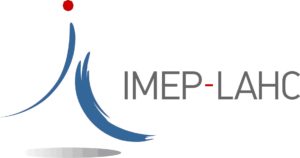Development of Atomic Force Microscopy techniques for the characterization of piezoelectric semiconductor materials – Applications in energy conversion
Published : 4 January 2021
 Postdoctoral subject:
Postdoctoral subject:
Development of Atomic Force Microscopy techniques for the characterization of piezoelectric semiconductor materials – Applications in energy conversion
IMEP-LaHC / MINATEC / Grenoble-France
Keywords:
AFM, Semiconductor Physics and technology, Nanotechnologies, Nanowires, Piezoelectricity, Multiphysics simulation.
Description of the project:
Semiconductor piezoelectric nanowires (NWs) (GaN and ZnO among others) have improved piezoelectric properties compared to thin films and bulk materials, due to their greater flexibility and sensitivity to lower forces. An intrinsic improvement in piezoelectric coefficients has also been identified by recent theoretical and experimental studies [1, 2].
These NWs can be integrated into nanocomposites (formed by NWs embedded in a dielectric matrix). Very recent theoretical studies in our team show that these nanocomposites can feature improved performance compared to thin films [3, 4]. This type of material is therefore very interesting for different innovative applications, like sensors and mechanical energy harvesting applications [5, 6, 7].
The piezoelectric performance of these nanostructures is highly affected by their semiconducting nature [4, 8]. It is thus very important to take into account the surface states and doping in the theoretical models and electromechanical characterizations. One of such characterization methods is Atomic Force Microscopy, where different modes, including the most advanced ones, can be concurrently used in order to characterize in a consistent way the electrical, mechanical and electromechanical properties of piezoelectric thin films and nanostructures [9, 10].
In the context of several European and national funded projects, the candidate will work on the AFM characterization of piezoelectric semiconducting thin layers and nanostructures (ZnO, GaN, between others). He/she will contribute to the development of new AFM techniques accompanied to theoretical simulations and to the evaluation of these nanostructures for innovative applications.
Depending on his or her expertise, the candidate will participate in the co-supervision of Master and PhD level students on several activities within the group, including (i) the characterization of nanowires and nanocomposites using AFM (Atomic Force Microscopy) techniques and (ii) the multi-physics simulation of the nanostructures and nanocomposite using commercial FEM simulation software (e. g. COMSOL Multiphysics).
The candidate will acquire expertise in (i) energy conversion using piezoelectric materials, (ii) AFM techniques (iii) electromechanical characterization of nanowires, (iv) design and simulation of transducers integrating piezoelectric semiconductor nanowires, (v) student supervision.
References:
[1] X. Xu, A. Potié, R. Songmuang, J.W. Lee, T. Baron, B. Salem and L. Montès, Nanotechnology 22 (2011)
[2] H. D. Espinosa, R. A. Bernal, M. Minary‐Jolandan, Adv. Mater. 24 (2012)
[3] R. Tao, G. Ardila, L. Montès, M. Mouis Nano Energy 14 (2015)
[4] R. Tao, M. Mouis, G. Ardila, Adv. Elec. Mat. 4 (2018)
[5] S. Lee, R. Hinchet, Y. Lee, Y. Yang, Z. H. Lin, G. Ardila, et al., Adv. Func. Mater. 24 (2014)
[6] R. Hinchet, S. Lee, G. Ardila, L. Montès, M. Mouis, Z. L. Wang Adv. Funct. Mater. 24 (2014)
[7] M. Parmar, E.A.A.L. Perez, G. Ardila, et al., Nano Energy 56 (2019)
[8] C. H. Wang et al., 4 Adv. Energy Mat. (2014)
[9] Y.S. Zhou, R. Hinchet, Y. Yang, G. Ardila et al., 25 Adv. Mater. (2013)
[10] Q. C. Bui, G. Ardila et al., 12 ACS Appl. Mater. Interfaces (2020).
More information:
Knowledge and skills required:
The candidate should hold a PhD in physics, applied physics or electrical engineering and should have a strong background in one or more of these areas: semiconductor physics, Atomic Force Microscopy (AFM), finite element simulation, clean room techniques and associated characterizations (SEM, etc.). A good level of English is required.
Location: IMEP-LaHC / Minatec / Grenoble, France
Start of the contract: February/Mars 2021
Duration of the contract: 1 year, renewable eventually
Advisor:Gustavo ARDILA (ardilarg@minatec.grenoble-inp.fr)
About the laboratory:
IMEP-LAHC is located in the Innovation Center Minatec in Grenoble. It works in close partnership with several national and international laboratories and industrial groups, preindustrial institutes and SMEs. The post-doctoral fellow will work in the Micro-Nano Electronics Components team, in the Integrated Nanostructures & Nanosystems group, and will have access to the laboratory’s technological (clean room) and characterization platforms.
Contacts:
Gustavo ARDILA ardilarg@minatec.grenoble-inp.fr +33 (0)4.56.52.95.32



 Contact us
Contact us How to find us
How to find us









